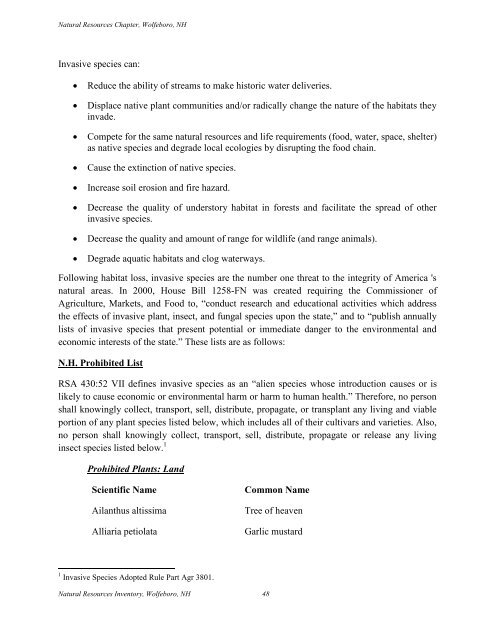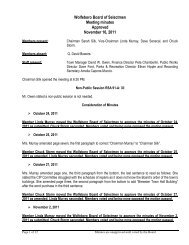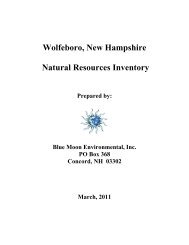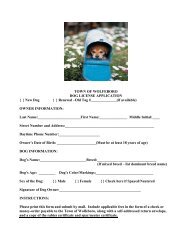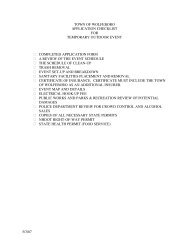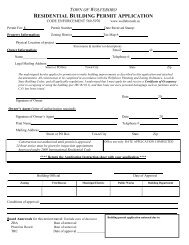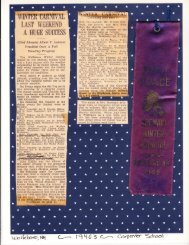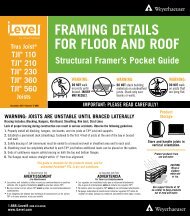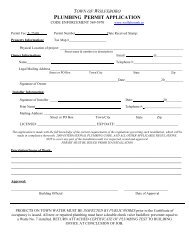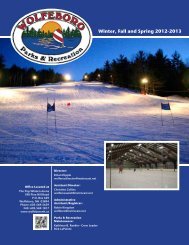Natural Resources Chapter of the Master Plan - Town of Wolfeboro
Natural Resources Chapter of the Master Plan - Town of Wolfeboro
Natural Resources Chapter of the Master Plan - Town of Wolfeboro
You also want an ePaper? Increase the reach of your titles
YUMPU automatically turns print PDFs into web optimized ePapers that Google loves.
<strong>Natural</strong> <strong>Resources</strong> <strong>Chapter</strong>, <strong>Wolfeboro</strong>, NH<br />
Invasive species can:<br />
<br />
<br />
<br />
<br />
<br />
<br />
<br />
<br />
Reduce <strong>the</strong> ability <strong>of</strong> streams to make historic water deliveries.<br />
Displace native plant communities and/or radically change <strong>the</strong> nature <strong>of</strong> <strong>the</strong> habitats <strong>the</strong>y<br />
invade.<br />
Compete for <strong>the</strong> same natural resources and life requirements (food, water, space, shelter)<br />
as native species and degrade local ecologies by disrupting <strong>the</strong> food chain.<br />
Cause <strong>the</strong> extinction <strong>of</strong> native species.<br />
Increase soil erosion and fire hazard.<br />
Decrease <strong>the</strong> quality <strong>of</strong> understory habitat in forests and facilitate <strong>the</strong> spread <strong>of</strong> o<strong>the</strong>r<br />
invasive species.<br />
Decrease <strong>the</strong> quality and amount <strong>of</strong> range for wildlife (and range animals).<br />
Degrade aquatic habitats and clog waterways.<br />
Following habitat loss, invasive species are <strong>the</strong> number one threat to <strong>the</strong> integrity <strong>of</strong> America 's<br />
natural areas. In 2000, House Bill 1258-FN was created requiring <strong>the</strong> Commissioner <strong>of</strong><br />
Agriculture, Markets, and Food to, “conduct research and educational activities which address<br />
<strong>the</strong> effects <strong>of</strong> invasive plant, insect, and fungal species upon <strong>the</strong> state,” and to “publish annually<br />
lists <strong>of</strong> invasive species that present potential or immediate danger to <strong>the</strong> environmental and<br />
economic interests <strong>of</strong> <strong>the</strong> state.” These lists are as follows:<br />
N.H. Prohibited List<br />
RSA 430:52 VII defines invasive species as an “alien species whose introduction causes or is<br />
likely to cause economic or environmental harm or harm to human health.” Therefore, no person<br />
shall knowingly collect, transport, sell, distribute, propagate, or transplant any living and viable<br />
portion <strong>of</strong> any plant species listed below, which includes all <strong>of</strong> <strong>the</strong>ir cultivars and varieties. Also,<br />
no person shall knowingly collect, transport, sell, distribute, propagate or release any living<br />
insect species listed below. 1<br />
Prohibited <strong>Plan</strong>ts: Land<br />
Scientific Name<br />
Ailanthus altissima<br />
Alliaria petiolata<br />
Common Name<br />
Tree <strong>of</strong> heaven<br />
Garlic mustard<br />
1 Invasive Species Adopted Rule Part Agr 3801.<br />
<strong>Natural</strong> <strong>Resources</strong> Inventory, <strong>Wolfeboro</strong>, NH 48


